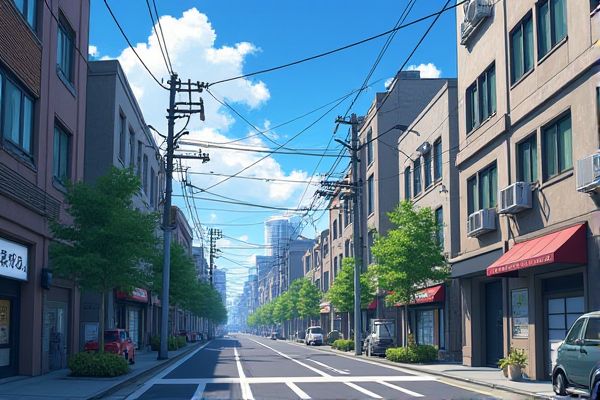
Cost of living in Japan: High urban living expenses. Rent varies by city. Utilities can be pricey. Health insurance required. Public transportation efficient, costly. Grocery prices fluctuate. Dining out relatively affordable. Education can be expensive. Expat taxes may apply. Import goods premium price.
High urban living expenses
In Japan, particularly in urban areas like Tokyo, Osaka, and Nagoya, the cost of living is notably high. A single person in Tokyo can expect to spend around Y=143,000 per month excluding rent, while a family of four might spend approximately Y=510,000. These cities are significantly more expensive than others globally, with Tokyo being 50% higher than Shanghai and Nagoya being even more costly than Tokyo in some aspects. For more detailed insights into living expenses in Japan, consider visiting the Expatica website.
Rent varies by city
The cost of renting an apartment in Japan shows a significant variation depending on the city and prefecture. Tokyo, being the bustling capital, commands the highest average rents, with prices reaching ¥91,000 for a 1R apartment and climbing up to ¥240,000 for a 3LDK apartment. In contrast, more affordable options can be found in other regions such as Ibaraki and Tochigi, where the average rent for a 1R apartment is much lower, at ¥35,000 and ¥33,000 respectively. For a comprehensive breakdown of rental prices across Japan's prefectures, you can visit the website Real Estate Japan for detailed insights and comparisons.
Utilities can be pricey
In Japan, the average monthly utility costs for a single person are significant, with electricity bills ranging from 4,000 to 8,000 yen, gas bills around 2,929 to 5,000 yen, and water bills averaging 2,000 to 3,000 yen. This results in an annual average of 136,200 yen for all utility costs. For more insights on managing these expenses, visit the Average Utility Charge in Japan article, which offers practical tips on reducing your bills and managing your budget effectively.
Health insurance required
In Japan, health insurance is mandatory for all residents, including foreigners staying longer than three months. The costs can vary significantly, ranging from Y=17,500 to Y=65,000 per month depending on the type of insurance and individual circumstances. For more detailed information, you can refer to the guide on Japan Health Insurance, which outlines the options and requirements to ensure that every resident is adequately covered.
Public transportation efficient, costly
Japan's Public Transportation system is highly efficient and convenient, providing reliable means of travel across the country; however, it can also be costly. For instance, a single subway ticket in Tokyo can range from 100 to 200 yen, and a monthly public transport ticket typically costs around Y=9,120. Moreover, longer-distance travel via the Shinkansen can be particularly expensive, with prices reaching approximately 10,000 yen depending on the destination. For more detailed information on this topic, visit the overview of Public Transportation in Japan, which dives deeper into the costs and logistics of getting around in Japan.
Grocery prices fluctuate
Grocery prices in Japan are fluctuating significantly due to a severe rice supply shortage exacerbated by a brutal summer heatwave. This has led to a 28% to 48% surge in rice prices. The overall food price hikes are driven by rising production costs, extreme weather, and increased demand. For more information on this issue that is affecting Japan's staple food market, you can visit the IntelliNews website.
Dining out relatively affordable
Dining out in Japan can be relatively affordable, with inexpensive meals at restaurants costing between ¥500 and ¥1,500, and lunch sets (teishoku) often available for around ¥1,000. Additionally, options like noodles, curry rice, and gyoza can be found for similar price ranges, making eating out accessible on a budget. For more detailed information on dining options, visit the Japan Guide, where you can explore a wide range of culinary delights available throughout the country.
Education can be expensive
Education in Japan can be expensive, with average monthly living expenses, including tuition, ranging from 104,000 yen in the Shikoku region to 158,000 yen in Tokyo. Tuition fees vary significantly, with national universities being the most affordable, while private universities, especially those offering courses like dentistry, can be up to 6.2 times more expensive than public institutions. For more detailed information about these differences, you can visit the Education in Japan website.
Expat taxes may apply
The cost of living in Japan for expats is significant, with average monthly expenses for a single person around $1,097 and for a family around $3,051. Additionally, expats must navigate dual tax obligations, with Japan taxing residents on worldwide income at progressive rates and non-residents at a flat 20.42% on Japan-sourced income, while also requiring annual US Federal Tax Returns.
Import goods premium price
When importing goods into Japan, the costs encompass customs duty, consumption tax, and other internal taxes such as liquor and tobacco taxes. The average applied tariff rate for all goods is 4.3%, with higher rates specifically for agricultural products at 15.5% and considerably lower rates for non-agricultural products at 2.5%. For a detailed understanding of these tariffs, visit the Customs Tariff page on the Japan Customs website, where you can find comprehensive information about various duties and taxes applicable to imports. This knowledge is crucial for businesses and individuals planning to engage in trade with Japan to ensure compliance and effective cost management.
